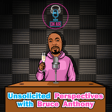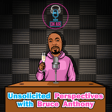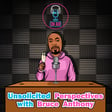
Navigating STEM, Gun Laws, and African-American Identity
In this engaging episode of Unsolicited Perspectives, host Bruce Anthony is joined by his sister, J. Aundrea, for their lively 'sibling happy hour.' The duo dives deep into a mix of serious and thought-provoking topics, from J. Aundrea's challenging transition from a liberal arts background to a STEM graduate program, to the recent school shooting in Georgia. They tackle the state's lax gun laws and the political responses, emphasizing the urgent need for stricter regulations. As they navigate these heavy discussions, Bruce and J. Aundrea also explore the uniqueness of the African-American experience, highlighting how African Americans have developed a distinct cultural identity deeply rooted in America due to their historical severance from African origins. #UnsolicitedPerspectives #BlackExperience #GunControlDebate #ADHDInsights #AmericanCulture
🔔 Hit that subscribe and notification button for weekly content that bridges the past to the future with passion and perspective. Thumbs up if we’re hitting the right notes! Let’s get the conversation rolling—drop a comment and let’s chat about today’s topics.
For the real deal, uncensored and all, swing by our Patreon at patreon.com/unsolicitedperspectives for exclusive episodes and more.
Thank you for tuning into Unsolicited Perspectives with Bruce Anthony. Let's continue the conversation in the comments and remember, stay engaged, stay informed, and always keep an open mind. See you in the next episode!
Chapters
00:00 Welcome to Unsolicited Perspectives
00:34 The Sibling Happy Hour
01:05 Navigating Grad School Challenges
05:08 Family Achievements and Reflections
09:12 Late Night Conversations and Rest
14:52 School Shooting in Georgia
23:47 Gun Laws and Political Responses
32:27 Moral Stance and Gun Laws Debate
34:28 Gun Laws and Background Checks
35:05 Historical Context of the Second Amendment
39:00 Mental Health and School Safety
55:40 Cultural Influence and Appropriation
01:09:10 Conclusion and Final Thoughts
Follow the Audio Podcast:
Apple Podcast: https://podcasts.apple.com/us/podcast/unsolicited-perspectives/id1653664166?mt=2&ls=1
Spotify: https://open.spotify.com/show/32BCYx7YltZYsW9gTe9dtd
www.unsolictedperspectives.com
Beat Provided By https://freebeats.io
Produced By White Hot


